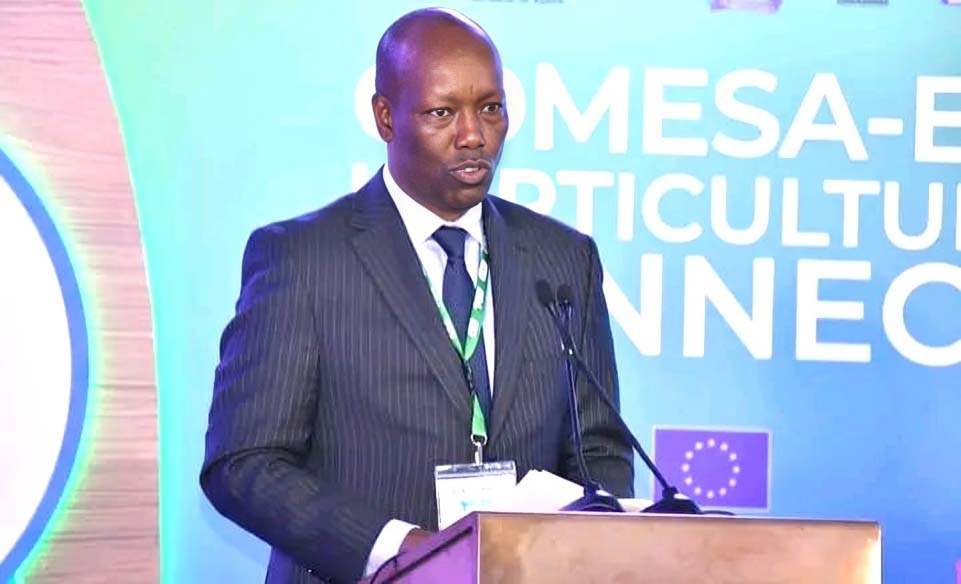October 9, 2025

Kenya is actively negotiating with five major horticulture markets to reduce import tariffs on its produce to enhance competitiveness and regain lost export ground. This move comes as the country faces challenges after its elevation to middle-income status, which triggered higher tariffs on Kenyan products, particularly affecting the horticulture sector.
Agriculture Cabinet Secretary Mutahi Kagwe, during the recent COMESA-EU Horticulture Connect forum in Nairobi, emphasized that this forum is a “springboard” toward building a competitive, climate-resilient, and digitally-enabled horticultural value chain across the COMESA region. Horticulture, he noted, is a pillar of Kenya’s economy and a major engine for regional trade. In 2024, Kenya’s horticultural exports surpassed Ksh137 billion ($1.06 billion), with cut flowers contributing over Ksh72 billion ($556.42 million). Remarkably, Kenya supplies 40% of all roses sold in the EU, exporting more than 60 million stems daily.

Kagwe highlighted avocados as a rising star in Kenya’s fruit export portfolio, with more than 128,000 metric tonnes shipped in 2024, generating $159 million. Despite setbacks from stricter EU regulations affecting vegetables like beans and peas, these crops remain vital for smallholder farmers.
To support this growth, the Kenyan government has launched the National Horticulture Traceability System (NHTS) to improve compliance and transparency. Additionally, trade agreements with the EU and UK have secured duty-free, quota-free access for Kenyan horticultural exports. Partnerships on cold-chain logistics with the Netherlands and training collaborations under Italy’s Lab Innova Programme further boost export efficiency and capacity building.
Nonetheless, challenges persist. Stricter EU pesticide residue standards have caused over a 50% decline in certain vegetable exports. Air freight shortages, rising transport costs, and currency appreciation negatively impacted flower shipments and export competitiveness in 2024, while droughts reduced avocado yields. Kagwe called for climate adaptation measures, affordable logistics, and financial tools tailored specifically to horticulture to enhance supply chain resilience.

Trade Cabinet Secretary Lee Kinyanjui also highlighted that the resultant higher tariffs, combined with a stronger Kenyan shilling and stiff international competition, led to a Ksh 20 billion decline in horticultural export revenues in 2024, down from Ksh 137 billion the previous year.
He reaffirmed Kenya’s commitment to implement strategic measures to attract foreign investment and sustain growth in the sector.
“Kenyans enjoy geographical and climatic advantages that allow year-round production to serve key markets like the EU,” Kinyanjui said, emphasizing Kenya’s ambition to increase both the quantity and value of its exports. The forum, hosted for the first time in Kenya, brought together buyers, producers, and SMEs to strengthen capacity and understanding of EU market requirements, certification processes, and quality standards, all critical for maintaining competitiveness internationally.
Kinyanjui also pointed out that Kenya is positioning itself as a dedicated export hub, supported by policies ensuring currency stability against the dollar, a stable political environment, high renewable energy adoption at 93 percent, and a vibrant youth population equipped with relevant skills.
He stressed the importance of investing in production and logistics to maintain the quality of perishable horticultural products. “COMESA has a population of 682 million, a large internal market ready to absorb our surplus,” he noted, calling on private sector actors to lead in scaling production, embracing standards, and forging regional and international trade linkages.
COMESA Secretary General Chileshe Mpundu Kapwepwe hailed the forum as a vital step toward regional integration and SME competitiveness. She emphasized that the initiative fosters stronger public-private partnerships, deeper market access, and new business linkages empowering women and youth-led enterprises. Through EU-funded programs like RECAMP, over 500 SMEs, including 30% women and youth-led businesses, have been trained and connected with international buyers.
The EU delegation’s Lana Žutelija highlighted agriculture’s critical role in the COMESA region, employing 70% of the population, and stressed that digital tools are no longer optional but essential for market access and international trade expansion. The Comesa-EU collaboration exemplifies how targeted cooperation and investments can strengthen systems, raise standards, and introduce cutting-edge technologies for horticultural growth.
The summit’s theme, “Leveraging Digitization to Deepen Regional Value Chains for Sustainable and Inclusive Growth,” reflects Kenya’s vision of integrating technology in trade to enhance efficiency and inclusiveness, particularly for women- and youth-led enterprises. The horticulture industry remains vital to Kenya’s economy, contributing about 1.6% to national GDP and securing its place as Africa’s leading exporter of cut flowers, fruits, and vegetables.
